| Srl | Item |
| 1 |
ID:
185803


|
|
|
|
|
| Summary/Abstract |
The role of skills has been eclipsed in the transition from an agrarian-craft economy rooted in hand-labour in small households to a modern political economy where productive work takes place outside the household, in offices and factories. Yet the ideological erasure of skilled work should not be confused with its actual disappearance. Precisely because such work was typically construed as private and unimportant, the embedded hierarchies and skills that shaped the handloom weaving industry in the North Indian province of United Provinces under colonial rule could escape systematic conversion to capitalist structures. Skill as human capital constituted the capitalist labour processes in the modern handloom industry, not as an abstract act, but as a historical experience. Handloom workers were reproduced, generationally, socially, and hierarchically, through the passing on of skilled labour within the unorganized informal sector of handloom weaving. Thus the stuff of community skills should move beyond its projection as either ‘endangered’ or ‘regressive’ to explore its access to capitalist structures and the exploitative networks that contain, transmit, and enable the production of skills.
|
|
|
|
|
|
|
|
|
|
|
|
|
|
|
|
| 2 |
ID:
164046


|
|
|
|
|
| Summary/Abstract |
The United Provinces and its urban centres were not in Partition’s immediate hinterland or a key subject of its high politics, but were pivotal, this paper argues, at an alternative scale of political mobilisation around volunteer movements. Central to this process were the spatial dynamics of organised violence in the early to mid 1940s, not least because of how pivotal organised killings were by 1947. By exploring the provincial patterns of the development of volunteer movements, their spatial and their inter-communal associations over time, and their ideological content (using a case study focussed on P.D. Tandon), the article argues that there were longer-term associations between organised volunteer activities and instances of pre-Partition violence that foreshadowed the large-scale attacks of the summer of 1947. This potentially affects the way historians read Partition violence as a specific ‘moment’ of communal antagonism and the significance of these movements’ ideologies of violence to India’s long Partition.
|
|
|
|
|
|
|
|
|
|
|
|
|
|
|
|